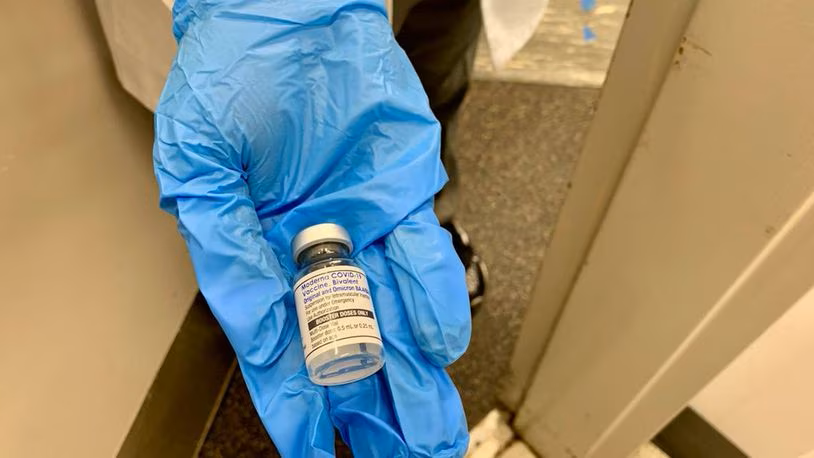
A nurse at a Walgreens pharmacy near Florida International University’s Tamiami campus on 107th Avenue in Miami-Dade shows a patient the newly formulated Moderna bivalent vaccine on Sept. 7, 2022. The vaccine is an “updated booster” designed to target not only the original COVID-19 strain, but also omicron BA.4 and BA.5, which had surged in the U.S. in 2022. (Howard Cohen/Miami Herald/TNS)
By Helena Oliviero
Only about 10% of residents in Georgia have gotten an updated bivalent booster
Three years into the pandemic, COVID-19 vaccines are an increasingly hard sell – especially in Georgia. According to the Centers for Disease Control and Prevention. Only about 10% of residents in the state have gotten an updated bivalent booster, which targets the original strain and omicron subvariants circulating now.
People are either unaware or simply not interested in the latest booster. And they likely aren’t getting the nudge from their doctor. A recent CDC study showed that nearly 60% of people surveyed had not received the bivalent booster because it had not been recommended by their health care provider.
The CDC is hoping to change that and move the needle. The agency is launching a nationwide initiative to talk to physicians about encouraging this latest booster, starting here in Georgia. The CDC stresses the bivalent vaccine is still important even though cases, hospitalizations and deaths in Georgia have been trending down now for several weeks. The threat of serious illness remains with the latest figures showing 65 Georgians dying of COVID during a recent week. (See box below for the latest on COVID in the state)

Dr. Debra Houry, CDC’s chief medical officer. CONTRIBUTED by CDC
The Atlanta Journal-Constitution interviewed on Monday Dr. Debra Houry, CDC’s chief medical officer, about this new CDC initiative, and whether everyone even needs a booster. And for those early adopters of the bivalent booster, is it time for another one?
The following Q and A has been edited for length and clarity.
Q: Why aren’t people getting the updated booster?
A: Our study did show that many people hadn’t gotten the updated vaccine because either they weren’t aware they were eligible or they weren’t aware that there was an updated vaccine. They might have thought that it was they had their primary series they were already done. I believe Georgia is among the lowest five states when it comes to being up to date on vaccines. Georgia is also in the bottom third when it comes to completing the primary series of vaccinations.
Q: What is your message to family physicians?
So my message was how important they are. And one of the things we talked about what are some practices that they can do, whether it’s having automated scheduling for vaccines, standing orders as part of visits, and making sure that they use materials that are culturally relevant and appropriate languages for patients (materials in other languages including Spanish).
COVID trends in Georgia
2,980: Confirmed cases, down from 3,974 the previous week.
65: Deaths, down from 95 the previous week.
60: New hospitalizations per day, on average, down from an average of 76 per day for the previous week.
Note: Confirmed cases and deaths are from March 2 to 8. Hospitalizations are the 7-day average from March 5 to 11. Source: CDC and DPH
Q: Who should get the bivalent booster?
A: Anybody who is eligible to receive the updated vaccine, but we especially encourage those who are at high risk so if you’re 50 or older and people who are immunocompromised or have underlying conditions.
Q: Why is important, especially for people in a higher-risk category to get the bivalent booster? What about people who have already gotten COVID? Some research suggests it can provide even better protection than the vaccine.
A: Because we have seen that the big update of your vaccines can reduce your hospitalization by over 50%. And some people think that because they’ve had an infection with COVID that it provides immunity, but being up to date on your vaccines is a safer and more dependable way to build immunity than getting sick. And vaccines can reduce severe symptoms compared to those who are not vaccinated.
Q: What about the early adopters of the bivalent booster? When it will be time for a second bivalent booster? Or will they need another booster?
A: The CDC and FDA advisory committee has not yet made a recommendation on this. There’s still some ongoing discussions. The FDA advisory committee is expected to meet in the months ahead, and this will be publicly done to discuss changes to the COVID vaccine strain composition for the 2023 fall and winter as well as any schedules moving forward.
Q: Not every doctor is convinced the bivalent booster is necessary, especially for young healthy people. What do you say to those doctors?
A: Being up to date on vaccinations can reduce serious symptoms and hospitalizations, even among children and young adults. And so it’s important to remain up to date and that the effectiveness of the safety of the vaccine outweighs the risks and when you look at things like the cardiac complications that can happen with COVID, I believe you can be two to six times more likely to have some of those cardiac complications from COVID than from a vaccine.
AJC Data specialist Stephanie Lamm contributed to this article.
Read the original story on AJC.com.











